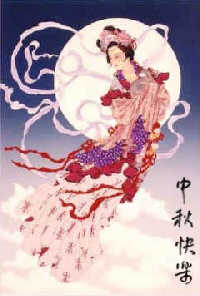 When Hou Yi returned home in the evening and learned what had happened, he felt the whole world had collapsed. As he shouted Chang E's named into the sky, he found the moon that night was especially clear and bright with a swaying silhouette similar to that of his wife. He chased the moon crazily, but failed to catch up in the end, as the moon moved with him.
When Hou Yi returned home in the evening and learned what had happened, he felt the whole world had collapsed. As he shouted Chang E's named into the sky, he found the moon that night was especially clear and bright with a swaying silhouette similar to that of his wife. He chased the moon crazily, but failed to catch up in the end, as the moon moved with him.
Missing his wife so much, Hou Yi had no other choice but to have his servants place Chang E's favorite fruits on a table in the garden where she frequently visited, to worship his beloved wife living on the moon. Informed of the news, other common people also did the same thing, praying to Chang E for good fortune and peace.
Since then, the custom of worshipping the moon on the mid-autumn day has been widespread.
Legend (2): Wu Gang Cutting the Cherry Bay
According to another legend about the Mid-autumn Festival, in front of the Guanghan Palace in the moon there is a cherry bay, which has grown exuberantly to a height of more than 500 zhang (about 1,650 meters). Under the tree, there is always a man trying to cut it down with an ax. However, every time he cuts it down, the tree will immediately spring back to its feet. Therefore, the tree has remained there in spite of the man's relentless efforts to bring it down for thousands of years.
The man was said to be Wu Gang, a native of Xihe County of the Han Dynasty(206BC-220AD), who attained immortality and entered the Heaven through apprenticing under an immortal. One day, he made a mistake, and as a punishment, his master hence demoted him to the moon to do such strenuous but useless labor work.
Legend (3): Zhu Yuanzhang and Moon Cake Uprising
The custom of eating moon cakes on Mid-Autumn Festival is said to have begun in the end of Yuan Dynasty(1271-1368). At that time,the general populace, faced with the unbearably cruel governing, rose up against the Yuan Government in succession. Under such circumstances, Zhu Yuanzhang, the first emperor of the later Ming Dynasty(1368-1644), set out to organize an uprising by uniting the various resisting forces. However, due to the oppressive presence the governmental officials (which included many searches of people and their property), it was extremely hard to deliver messages.
